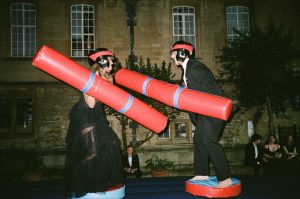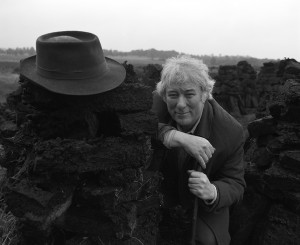
The Snail, Or Nancy
by Alex Chasteen | July 23, 2019
When I write her into a story, the first thing I do is make her older. She’s in her thirties, age starting to show on her face, but still dressing young. In real life, I have left California, and soon she will too. We know things will never be like this again, but one day, as real adults, we will converge once more. So this is the age I write her into.
When I write her into a story, I make her the greatest interviewer in the world. She starts humbly, at her college radio station, and begins to gather a following. Her show is just her interviewing a weekly guest. She finds a woman from South Dakota, who introduced herself at a bus stop via a sexual proposition for money, and asks her: imagine you make a deal with a devil. He creates a snail that cannot die. Its only goal is to chase you, and if it ever touches you, you die. For a million dollars, would you do it? Two million? For a billion? She interviews a janitor who maps the sewers, a Milton scholar who spent three years in New Hampshire distilling maple syrup, a Japanese architect who has never eaten a hot dog. She asks, and asks, and no one ever turns the questions back to her.
In the story, I find her show online, and I listen on the bus to work. Sometimes I know why she asks that question in particular. Sometimes I hear her ask questions she has asked before, and I smile. Sometimes I imagine driving through her town – I lie, say it’s on the way – and I call, and she has me on the show, and I prepare my answers. Nancy hates nothing more than a non-answer – though I know that she herself never knows what to say.
Like when I asked her: if you had a perfect soulmate out there, and I mean perfect, where would you eat on your first date? She hemmed and she hawed. First she asked, how am I sure about soulmates? A psychic tells you, I said. Or you’re psychic. God tells you. Doesn’t matter. Then she said sushi, which is terrible first date food but my soulmate would understand. But that wasn’t right. Then she said maybe Korean barbecue, because how you eat Korean barbecue says so much. But this wasn’t right. Then she said her soulmate – if they were really perfect – would have to choose, and if they were really her soulmate they would choose perfectly. They would order for her, and it would be the perfect choice. I said, cop out. And she said, I know, I know.
Her show would start to get local attention, then become a bigger and bigger deal. This isn’t the A plot; it’s flashback, exposition. By the time of the story, her technique is exquisitely refined. By then, she is so smooth that her guests forget she is a stranger and feel like they have known her for years. Or even that she knew them before, that in some other life they had fallen in love maybe, or were mother and child, and when they were born, they forgot. But Nancy remembered, and she could look into your eyes and see all the lives you have ever lived, and pluck the question, the one perfect question, right out of you. And she could show you, through asking, the answer.
In the story, there develops fierce competition to coax answers out of her. Anything from her life, even the smallest relinquished detail, is a victory. Journalists track down college friends, high school acquaintances, minimum-wage-job coworkers, and shake them down. None of them have anything to give up. Even those closest to her knew only the barest details – she was from somewhere near LA. Born in Vietnam, came to America at a young age, though no one knew how young. She gave herself a new first name, which I change in the story, but told no one her first name, the one she was born into. She kept her last name, which I keep too, as Nguyen isn’t much for tabloids to go on. No internet presence, and huge swathes of her life left with no documentation at all. Jobs held and rent paid under the table, tabloids guessed. At twenty, it seems, she burst into the world, fully-formed, in the recording studio on the fourth floor of the student union.
When work is slow, I see these stories with their baiting headlines and sometimes I read them. I keep a document on my computer of all the stories where someone remembers something right, or something almost right, when someone recounts half a detail about a party, a restaurant we went to. I note, too, names of those who obviously never knew her. I can always tell.
Sometimes I read ten in a row and go home thinking of nothing else. On these nights I drink an entire bottle of Trader Joe’s white wine, the kind we used to buy, and I put on the songs that played on the radio then. In the empty apartment, I sing along and I still know all the words. I stand in front of my big hallway mirror and practice what I would say if I ever spoke about her. But even though I was her close friend in high school and one of her best friends in college, and even though we lived together for two years, no one’s found me.
In the interviews, news anchors with famous names ask me simple, open questions, and I tell them everything. In these years we took a lot of photos together, which I show – from our trips to downtown LA on the Saturday train, bus trips to Berkeley, her posing in front of hundreds of meals. Photos she sent me when I was away in college, us in Vegas or the Grand Canyon or McDonald’s or Disneyland. The world’s eyes, suddenly, turn to me: we knew nothing, and then we knew everything. Then the effect of the wine starts to fade, I tire, and I go to bed. When I wake up, no one knows anything again.
Everyone pressures her to get a show, a podcast, anything, but she demurs. She will interview almost anyone, and she delights in appearing in bizarre places, speaking to bizarre people, and vanishing again. Websites attempt to track her appearances and make sense of them, but there is no pattern. I, too, cannot follow her logic, except that she goes wherever it would be funny to show up.
The media gets so caught up in the mystery of her that everyone seems to forget that this, her humor, is her greatest charm. In our time living together, she became much more subdued, but even so, we spoke only in riffs, a game of one-upping absurdity. This is what I try, but fail, to get across in the mirror. She was hysterical, I slur. So fucking funny.
There is much, as drunk as I get, that I do not tell the mirror. I do not talk about her sister, who is infinitely stranger than Nancy herself. I do not talk about when in high school she twice slept over on a school night. I do not talk about the circumstances that led to her living in my house, which she did not even tell me. I say she is funny, thoughtful, brilliant. She has a talent for statistics. She has accumulated over four hundred and fifty thousand points on her Edwards-Regal rewards card. I do not say she has endured things that I cannot imagine. I don’t even think those things to myself. She’s funny, I repeat. Funniest person I ever met.
I refrain even from repeating some of the nicest things. I do not say that she knew better than anyone how not to compare pain. I say, she was my best friend. She isn’t like anyone I’ve ever met. She isn’t like anyone at all.
When I drink in bars I worry that I will let this fantasy slip and tell someone. I keep myself to two, three beers. When I wake up after blacking out, I am terrified that I said something and scour the news, flip through the channels on cable TV. Even though I can’t find anything, I do not sleep easily.
I do not see her until our twenty-year high school reunion. All our friends gossip about who’s going – Anne swears DC keeps her too busy, Michelle hates all of us, and some of us are dead – but no one can decide on Nancy. For her to appear at something like this seems so unlike her that’d it’d be impossible – and so of course she’s there.
I am certain she would never come, because even before all this, she hated parties. But our best-friendship, it seemed, was good for nothing, because she comes up behind me and scuttles her long nails down my back, a sensation I’ve never forgotten. I say Nancy, I say oh my God, and she says how are you, how are the students treating you?, and I begin to ramble, and she riffs and I riff and we talk and talk and I check my watch and it has been hours, and I say God, I have to see everyone else too. I turn around to see who I might drag over. When I turn back she is gone. When I call her she doesn’t pick up. I call three times because she is always on Do Not Disturb but she doesn’t pick up and of course she changed her number – dumb. I spend the rest of the night searching for her and do not find her. I find our friends, and I say, have you seen Nancy, and they say NANCY, and I say, Nancy, and they say no, how is she? I realize then that the entire time, I did not ask her a single question. Not one. ∎
Words by Alex Chasteen.




